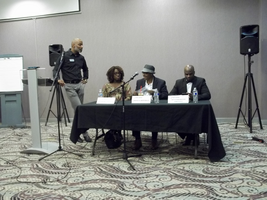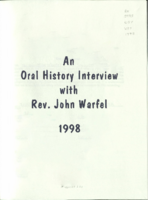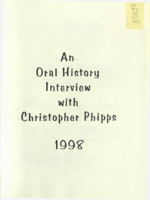Search the Special Collections and Archives Portal
Search Results

Transcript of interview with Sari and Paul Aizley by Claytee D. White, November 4, 2016
Date
Archival Collection
Description
As Sari and Paul Aizley recall their separate childhoods and journeys to Las Vegas, their work and volunteer histories, their efforts to build a better society, and their life together they speak to each other as much as they respond to questions about their observations on the growth of the Las Vegas urban environment and their contributions to Southern Nevada's cultural development and a just society. In this interview, Sari and Paul speak to the cross-town commute and the physical UNLV campus in the late 1960s; the growth of the UNLV Math Department; the evolution of UNLV's Continuing Education; the State's North-South funding rivalry as reflected in the built environments of University of Nevada in Las Vegas and in Reno; plans to build a paleontology research facility at Tule Springs National Monument; the Review-Journal's "Ask Jessie Emmet" Real Estate column; local ACLU offices and politics; Fair Housing; transgendered persons; the Nevada State Assembly, and Class! magazine for Clark County high school students. Sari and Paul smile at each other as they recall how the editor/publisher met the bearded math professor and fell in love—despite the fact that they tell slightly different versions of their initial meeting(s). Sari passed away November 1, 2017, three days shy of one year after she participated in this interview.
Text
Lee Plotkin oral history interviews
Identifier
Abstract
Oral history interviews with Lee Plotkin conducted by Dennis McBride on August 02, 10, and 16; and October 04, 2006 for the Las Vegas Gay Archives Oral History Project. In these interviews, Plotkin talks about his reaction to Lieutenant Governor of Nevada Myron E. Leavitt's claim that attending the Nevada Gay Rodeo violated Nevada's sodomy laws in the early 1980s. Plotkin recalls his childhood, coming out during high school, his early involvement with the Las Vegas, Nevada gay community, and his memories of Lieutenant Governor Leavitt and Leavitt's family. Plotkin also discusses the development and activities of LGBTQ organizations and demonstrations, including Golden Rainbow and Gay Pride. Lastly, he talks about the repeal of Nevada's sodomy laws in 1993, the defeat of Nevada Citizens' Alliance's anti-gay initiative petition Minority Status and Child Protection Act of 1994, and the growth of the Las Vegas LGBTQ community.
Archival Collection
Kevin M. Kelly oral history interviews
Identifier
Abstract
Oral history interviews with Kevin M. Kelly conducted by Dennis McBride on September 08 and 22; and November 10, 2000 for the Las Vegas Gay Archives Oral History Project. In the interviews, Kelly talks about his family and early life in Boston, Massachusetts with a focus on his Catholic upbringing. He recalls his law education, serving in the United States Army during the Vietnam War for eleven years, and discovering his sexuality in 1966 while working in the Boston City Hospital. Kelly then describes being discharged from the military due to allegations of being gay, and his family's reaction. He then recalls moving to Las Vegas, Nevada in 1978, where he was involved in a robbery and shooting incident with a male sex worker in 1982. Kelly goes on to recall the trial that proceed the incident and how it publicly outed him. He details how he was charged with felony sodomy and ultimately lost his job as a result of the trial. Finally, he talks about serving on a task force to investigate bias in Nevada's court system in 1992 and being honored in 1994 by the Gay and Lesbian Community Center of Southern Nevada for his work.
Archival Collection

Various people at the LGBTQ African American community panel discussion at the Gay and Lesbian Community Center, Las Vegas, Nevada: digital image
Date
Archival Collection
Description
Image

Transcript of interview with John Warfel by Dennis McBride, March 11, 1988
Date
Archival Collection
Description
This is Dennis McBride, today is Wednesday, March 11,1998 and I'm talking with John Warfel at Christ Church Episcopal who 's going to be leaving Las Vegas permanently March 16, so I'm very grateful that he made some time for me today. We're going to be talking about Christ Church, about Dignity and their experience here, and about Mr. Warfel himself.
Text

Transcript of interview with Christie Young by Dennis McBride, October 18, 1998
Date
Archival Collection
Description
I've known Christie Young for many years and was grateful she agreed to be interviewed for the Las Vegas Gay Archives Oral History Project. Not only is she frank in what she says, but her background as a researcher in sexual issues and as a straight woman involved in the gay community give her a unique perspective. Ancillary to her donation of this interview transcript to the University of Nevada, Las Vegas, Christie has generously donated her personal journals which detail more than a decade of her life including the years she worked with Las Vegas's gay community . Christie shares the project's concern that documentation of the gay community is ephemeral and vanishes rapidly; her determination that her contribution to that community be preserved greatly enriches our knowledge and will benefit future scholars.
Text

Transcript of interview with Ron Lawrence by Dennis McBride, June, July and August 1997
Date
Archival Collection
Description
Ron Lawrence is one of the busiest people in the gay community, so I want him to know how much I appreciate his reserving time for me so that I could complete this oral history interview. The importance of his work toward the well-being of the gay community in Las Vegas cannot be measured, and much of what he's accomplished and otherwise made possible will live long after he leaves us. With Ron's consent to this interview, our knowledge of Nevada's gay history is greatly enriched and our record preserved.
Text

Transcript of interview with Ellen DeLand by Dennis McBride, January 19-20, 1996
Date
Archival Collection
Description
Ellen DeLand was born on April 1, 1931 and went to Santa Monica High School. She was very active in the Las Vegas LGBT community. She was interviewed January 19, 1996.
Text

Transcript of interview with Christopher Phipps by Dennis McBride, November 6, 1998
Date
Archival Collection
Description
Christopher Phipps, attorney in Las Vegas discusses his life. Hailing from Honolulu, Hawaii, and his adventure that led him to Las Vegas, Nevada.
Text
